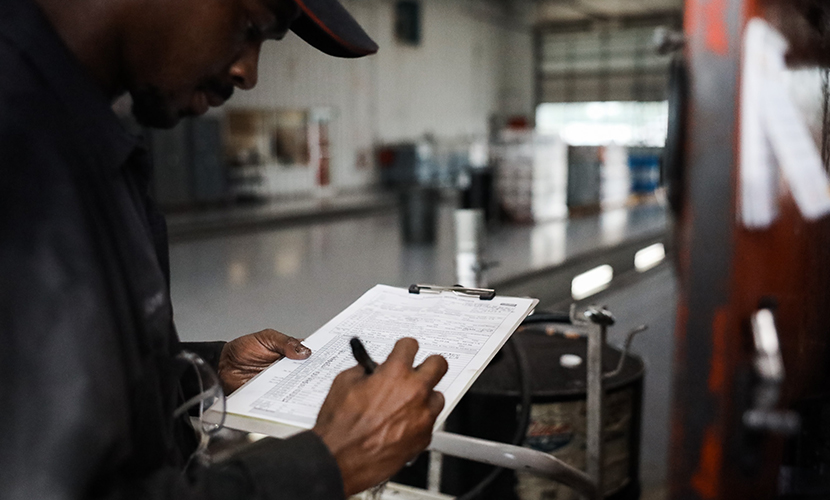The Benefits of GPS Vehicle Tracking for Fleet Management

Fleet management has come a long way with modern technology. There was a time when tracking the locations, destinations, and travel times of fleet vehicles was a matter of paperwork – lots and lots of paperwork. Today, computerized systems can keep track of everything with ease and can even use real-time traffic condition information to make dynamic adjustments to routes, arrival estimates, and more.
One powerful tool in the arsenal of any fleet manager is fleet tracking using GPS modules. Sometimes, these are built into the vehicle; others, they’re modules you install on your own. Either way, by linking to a system of satellites in orbit, accurate location information can be sent to a centralized computer system at all times.
Some people question the utility of these systems, so today, we’re going to run through the many benefits of GPS vehicle tracking for fleets.
Benefit 1: Route Optimization
Perhaps the biggest benefit to comprehensive GPS vehicle tracking across your fleet is the ability to use software to optimize routes and planning, and all of the many ways that can benefit your fleet across the board.
For example:
- When picking a driver and vehicle for a job, you can automatically identify the one most nearby that is not otherwise occupied, reducing the overall mileage driven and improving response times.
- Route planning can help identify bottlenecks, traffic backups, and other locations that should be avoided, either temporarily or indefinitely, and can route vehicles around those areas.
- Optimized route planning can provide a variety of benefits to areas such as reducing your carbon footprint, reducing fuel consumption and costs, reducing mileage and wear on vehicles, adapting to changing conditions in real-time, and much more.
With as many potential benefits as computerized route planning has, it’s even better when you have real-time knowledge of where every vehicle is, where it’s going, how long it will take to get there, and what route it’s taking. Without location tracking, all you have are estimates.
Benefit 2: Driver Behavior Monitoring and Improvement
Driver behavior can play a surprisingly large role in fleet management. Proper defensive driving can improve fuel efficiency, reduce wear on vehicles, prevent accidents, and even result in happier and more effective drivers.
Without some means of tracking vehicle movement and telemetry data, however, you don’t have any way to identify driver behavior beyond incident reports and self-reported behavior. With GPS location tracking, you can monitor locations, speeds, and speed changes, all of which can give you valuable information about driver behavior.
More advanced fleet tracking systems do more than just track location via GPS. They can also track telemetry data from the vehicle’s onboard computer and can even provide additional detection for driver behaviors. You can identify anything from fuel fraud to harsh acceleration and braking to off-route driving to distracted driving.
Per ITConvergence:
“Recent studies show that some of the benefits fleets can obtain from IoT fleet monitoring systems include:
Fuel economy increased by 20%
Economical driving improved by 15%
Harsh-braking incidents decreased by 75%
Engine idle time down 60%
Driving hours decreased by 20%
Safety incidents reduced by 20%
Compliance increased by 15%”.
Perhaps more importantly, you can identify drivers who don’t violate policies and proactively reward those drivers. These driver incentives both provide incentives to noncompliant drivers to adjust their behaviors and reinforce those behaviors amongst compliant drivers.
Benefit 3: Cost Improvements
Time is money.
Knowing where your vehicles are allows you to send the closest applicable vehicle to whatever need you must fulfill. Shorter routes, faster responses, and more optimized routes can all save time and money.
All of these also save money by reducing mileage and wear on vehicles. Yes, we’ve already mentioned this, but it bears repeating: the costs saved can be immense, especially in larger and more distributed fleets.
Another way you can save money is by reducing premiums on fleet vehicle insurance. Insurance companies are well aware of the many benefits of GPS tracking and often offer discounts for fleets that implement it to their standards. Some estimates claim you can save as much as 35% off of your insurance costs.
You can also proactively understand when your fleet is reaching capacity and can justify purchasing another vehicle or when your workload is improperly balanced and you have vehicles being underutilized.
Benefit 4: Proactive Problem Identification
There are many possible problems that vehicles in a fleet, or a fleet as a whole, can encounter in daily business. GPS can’t solve all of them, but it can help with some of them.
These include:
- GPS can tap into map information that monitors traffic in real-time and can identify areas where traffic is backed up or stuck at a standstill, identifying alternate routes ahead of time so your vehicles can avoid slow, idling, or less efficient detours.
- GPS can monitor accident information and take steps to reroute around road closures and other issues that crop up with little or no warning.
- GPS can monitor vehicles on an individual basis. When the fuel efficiency, speeds, or other behaviors reach certain thresholds, it can indicate a problem with the vehicle that can be solved with preventative maintenance, often before the driver even consciously notices the issue.
- Vehicles can be given leeway to travel within a given area, but geofencing can send alerts to dispatch or the fleet manager when the vehicle leaves that allowable area.
This just scratches the surface of what can be done with a combination of GPS tracking, vehicle telemetry, and driver monitoring.
Benefit 5: Loss Prevention
Perhaps one of the biggest benefits to a fleet provided by GPS tracking is loss prevention. Whether it’s pickup trucks or semi-trailers, GPS tracking is always active and will phone home with the location of vehicles even when those vehicles aren’t in active operation, such as overnight.
Alerts can notify you when vehicles or assets move outside of their expected area or even when they move unexpectedly when they shouldn’t, such as overnight when a driver is at home or asleep.
In the worst-case scenario, when assets are stolen, GPS tracking can allow their swift recovery. With active monitoring from home base, police can be notified even before a theft is completed, and the response times can be swifter than you’ve ever thought possible.
This isn’t hypothetical, either. Here’s a real case where GPS saved a company.
“The organized ring of thieves struck when they thought nobody was watching: in the middle of the night on a weekend. One by one, they drove off with ten trucks and trailers from the lot of Diamond Landscapes, a commercial landscape company serving central Kentucky.
The potential loss of these vehicles, valued at over $500,000, could have devastated the company as they waited for insurance to help them recover and resume operations. Just one catch – Diamond Landscapes saw the whole crime unfold in near-real time.
The thieves didn’t know about the fleet management technology within the vehicles. Using an app, it was easy for company officials to watch their trucks moving as they were being stolen. They called the police. A high-speed chase quickly ended when the owner of Diamond Landscapes, Chris Trower, was able to share location data with law enforcement.
Every stolen truck and trailer was recovered. Instead of waiting weeks or months to resume operations, Diamond got back to its full-service landscaping and snow removal business right away.” – Contractor Magazine.
Of course, an incident like this will still be hugely disruptive to a fleet even if the vehicles are recovered nearly immediately. GPS tracking can’t prevent thefts, other than in the sense that if thieves are aware that GPS tracking is enabled, they may be less likely to attempt to steal the vehicles. It’s a reactive but valuable service GPS tracking can provide.
Benefit 6: Fraud and Misuse Detection
In some cases, drivers may wish to use a work vehicle for purposes outside of work. Maybe they want to take the truck home with them for a task to save on fuel costs or rental expenses. Maybe they’re abusing a company gas fund for personal use. Maybe they go out of their way on a route to provide some kind of ride-sharing on the side.
Whatever the case, these kinds of fraud and misuse can, in part, be detected by GPS tracking systems.
“There may be times when your drivers use your vehicles for their errands. For example, they may stop off to see a friend or relative or to do some other errands without asking for prior permission. To hide the fact, they may tell you that the delay was due to traffic or an accident or being stopped by the law enforcement authorities. Another common one is when they make long-distance journeys but decide to go their own way rather than staying on the agreed route. This may cause more expense in terms of fuel costs.” – Veturilo.
When such abuse is detected, swift action can be taken, and investigations can be launched. GPS evidence is proof and justification.
Benefit 7: Reduction of Paperwork and Data Entry
A key benefit to GPS tracking is that, while many (though not all) of these benefits can be done in other ways, those ways require immense amounts of active data entry and human analysis. By using GPS tracking and computerized tools for fleet management, you can offload the data entry to APIs and automatic systems, you can use complex algorithms to solve routing problems, and you can deliver route instructions directly to drivers without needing to mess with phone calls or dispatch.
While it might not seem like much, any reduction in paperwork and data entry is excellent. Not only does it help modernize a business, but it also reduces carbon footprint and, more importantly, the potential for human error.
Benefit 8: Proactive and Preventative Maintenance Improvements
In addition to the above-listed ways in which GPS tracking can reduce mileage and wear and tear on vehicles, you can also use it to proactively schedule preventative maintenance. Instead of having to funnel all of your vehicles back to a central shop to have work done on them, you can automatically use the GPS tracking system to identify nearby maintenance providers. Then, by making those providers part of your route planning, you can ensure that any time maintenance or inspections are necessary, the vehicle is near a location.
To build up a network of service providers rapidly, you can work with us. At Epika, we partner with businesses across the nation to provide fleet maintenance services virtually anywhere your vehicles could end up. You can find locations near you quickly and easily with our map and integrate that knowledge into your GPS tracking with ease.
Common Concerns with GPS Tracking
GPS tracking isn’t necessarily all upside, though we believe the benefits outweigh the drawbacks. It’s still worth mentioning a few concerns or issues with the system.
Is GPS tracking even legal? Yes, in general. Some states in the US and some countries around the world may prohibit it or may require that you inform your drivers and get their consent, but since you can make that a condition of employment, it’s not a high bar to clear.
What data is tracked? Location data is essentially the only data point collected by a GPS tracker. However, computer systems can extrapolate other data from this, including average speeds, instances of hard acceleration or braking, and so on. Some tracking systems integrate more than just GPS, including driver monitoring, idle monitoring, and more, but those are outside the scope of today’s discussion.
Aren’t GPS systems inaccurate? Not really. Modern GPS is a very refined system – just about every smartphone has a good one in it – but cheap systems can have signal strength issues on occasion. Generally, investing in a middle- to high-quality system will alleviate these issues. Sometimes, in rural areas, GPS can struggle (especially if the system piggybacks off cell signals), but usually, that’s not a huge problem.
So, what are you waiting for? The benefits of GPS fleet tracking are immense, and while it can take some time and a skilled technician to install the systems, it’s well worth the effort. Plus, we can help. Our network of partner businesses is full of experienced technicians more than capable of installing a system for you. Just reach out to get started or to ask us any questions you may have.









